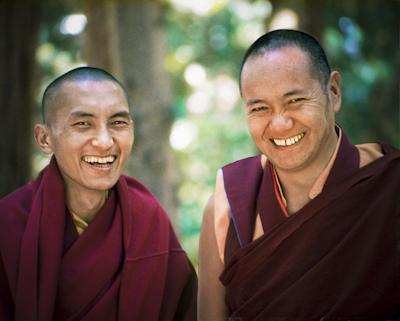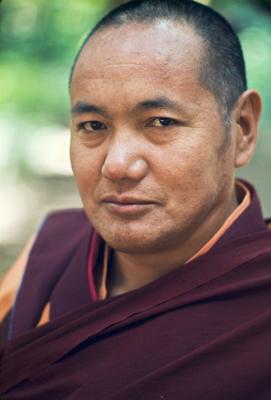E-letter No. 9: October 2003

Dear Friends,
I hope you are well. Thank you for subscribing to the Lama Yeshe Wisdom Archive e-letter. Please share it with your friends. If you would like to reprint any of our short, e-letter teachings in your center’s newsletter, please feel free. Go here for previous issues.
I don’t know about you, but when I get my copy of this e-letter, it somehow gets all chopped up in transmission. The lines are of uneven length, the paragraphs don’t work properly and it looks nothing like it did when I first wrote it. In order to bring you a more attractive communication, we’d like to move to doing it in HTML instead of text, as we presently do. We think most people’s e-mail programs can handle HTML, so the next one will be in that format. If you know that your e-mail program cannot handle HTML, just go to our e-letter page and follow the instructions for changing your preference.
I have another request from our spiritual director, Lama Zopa Rinpoche. We are entering another crucial period in the development of the Maitreya Project. Rinpoche requests us to recite the Heart Sutra as many times as we can over the next two weeks. Please go here for a copy of the text. And thanks to all those who so kindly recited the Sanghata Sutra the last time we made this request; your recitations made a noticeable difference to the Project. I’m sure our recitations of the Heart Sutra will also help. Please let me know how many you recite: [email protected].
As I told you last time, we have four books in the works. The new Becoming Your Own Therapist and Make Your Mind an Ocean combined edition is being printed, as is our reprint of The Essence of Tibetan Buddhism. These will be available early November. Our grateful thanks go to Thubten Yeshe and Doren & Mary Harper for sponsoring these titles.

Our new book of six talks by Lama Yeshe is almost ready to send to the printer. It’s called The Peaceful Stillness of the Silent Mind. You’re going to love it. And our anthology of great teachings by great lamas is in the final editing stages—please see our last e-letter or go here for more information.
We’ve also added some teachings to our website, mainly Lama Zopa Rinpoche’s Tara, the Liberator. Also there’s a transcript of the Death and Rebirth module that I prepared for the FPMT’s Discovering Buddhism at Home correspondence course. Check out the Discovering Buddhism program on the FPMT’s beautiful newly designed website.
Finally, we are preparing to launch a wonderful new Lama Yeshe Wisdom Archive membership program, in which you will be able to support the creation of a series of up to 100 new books by Lama Yeshe and Lama Zopa Rinpoche. Stay tuned for details!
Thank you so much for your kind support.
Much love,
Nick Ribush
Director

Religion is not just some dry, intellectual idea that appeals to you. Rather, it should be your basic philosophy of life; something that through experience you have found relates positively with the energy of your psychological makeup. If you hear an idea that seems to make sense, first see if you can get a taste of it through experience. Only then should you adopt it as your spiritual path.
Say you encounter Buddhist philosophy for the first time: “Oh, fantastic. This is so good.” Then, because you regard these new ideas materialistically, you try to make radical changes to your everyday life. You can’t do it; it’s impossible. You can only change your mind gradually. To actualize Dharma you have to start from where you are and base any practice that you do on that foundation. But to abandon your basic nature and try to change yourself according to some fantastic idea, as if you were changing clothes—that’s really hallucinating. That’s too extreme. People who do that have no understanding of the nature of the spiritual path. That’s dangerous. You check up; we tend to judge things very superficially.
If we were to ask ourselves what is the nature of spirituality and what is the nature of materialism, we’d all come up with different answers. There would be no unanimous conclusion. This is because we all think differently and we’ve all had different life experiences. Even if you show a group of people some unknown material substance and ask them to identify it, they do so on the basis of their previous experiences and may come up with many different answers. For similar reasons, we all reply differently when we’re asked to define the religious and the materialistic life.

My point of view is that following a spiritual path does not automatically mean that you have to reject material things and leading a materialistic life does not necessarily disqualify you from the spiritual. In fact, even if you are materialistic, if you really check deep within your own mind’s nature, you’ll find that there’s a part of it that is already on a religious trip. Even if you declare, “I’m not a believer,” nevertheless, within your mind the religious dimension is there. It may not be intellectualized, it may not be your conscious philosophy, but there’s a spiritual stream of energy constantly running through your consciousness. Actually, even the intellectual and philosophical aspects of religion are also there in your psyche, but they have not come from books or papers; they have always been there. So be careful. Your extreme views may interpret that spirituality and materialism are completely contradictory, but they are not.
Actually, from the point of view of religious tolerance, the world is now a better place than it was even less than a century ago. At that time people held highly extreme views, especially in the West. Religious practitioners were afraid of non-religious people; non-religious people were afraid of those who were religious. Everybody felt very insecure. This was all based on misconception. Probably most of this is now behind us, but it’s possible that some people still feel like this. Certainly, many feel that spiritual and materialistic lives are totally incompatible. It’s not true.
Lama Yeshe gave this teaching at Melbourne University in April 1975. Edited by Nicholas Ribush. It comes from a chapter on spirituality and materialism in the forthcoming Lama Yeshe Wisdom Archive book, The Peaceful Stillness of the Silent Mind, a collection of six teachings by Lama Yeshe.
